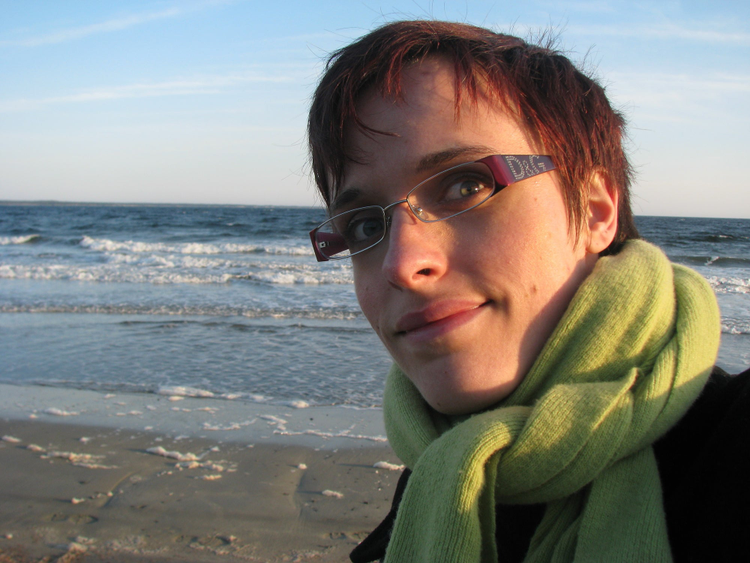Making waves can make a better world for everyone

In recognition of Disability Employment Awareness Month, Adobe employee Lauren Gardner talks about why it’s important to share your story when you’re ready, and why you need to make waves.
Life is great for Lauren Gardner. They have a great job, a wonderful partner, a beautiful home, and two “fabulous fur-babies,” as Lauren calls them — but it wasn’t always that way.
Until they left the village where they grew up in Nova Scotia, Lauren was the target of vicious bullying. This was partially because Lauren has always spoken up and made waves. Unfortunately, it was also because they have a disability that affected how they looked and moved.
In the story they shared during Adobe For All Week, Adobe’s annual internal diversity, equity, and inclusion event, Lauren talked about growing up with cerebral palsy, hydrocephalus and a genetic disorder and their journey to becoming who they always wanted to be. They urged everyone to make the world a better place by making waves, too.
We talked with Lauren about what it was like to share their story and why it’s critical that everyone has the opportunity to bring their full authentic selves to work.
What was it like sharing your story with such a large audience during Adobe For All Week?
I was very nervous going in because, when I was younger, people would sometimes be dismissive when I talked about this, but I also wasn’t telling the whole story then. When I started being more open with what happened, people connected to my experiences. It took a lot to share it, but with the responses I got and how I feel coming out of it, it was worth it.
What kind of responses did you receive from people who listened to your story?
It was so positive, and the number of responses was unexpected! I’ve received so many messages, and my Slack has been blowing up. I even heard from someone who went through something similar but isn’t at the point of talking about it yet. I shared with them that’s OK. But when you’re ready, sharing your story, while it might be scary, is a freeing thing.
My biggest takeaway from this experience is that I don’t have to hide my story any longer. Before, I’d have to dance around where I was from and how I got here, and I don’t have to do that anymore. I want to inspire other people to do the same and be their authentic selves at work.
You talked about “making waves” and speaking up against injustice when you see it. Why is that important?
What I experienced wasn’t what many people think of when they hear “bullying.” It wasn’t simple schoolyard taunts. It was dehumanizing, and I think my disability was part of why I was targeted. But it doesn’t need to be that extreme to stand up against it.
It’s important to call it out because bullying and exclusion can happen in the workplace, too. We need to be aware and speak against it when we see it. It’s so easy to laugh with the rest of the group; it’s a lot harder to put your foot down, but it’s crucial.
One tactic I learned is to ask, “Hey, what did you mean by that?” or “I don’t really get the joke. Could you explain it?” That often shuts down a bully because they don’t expect pushback.
Why is disability inclusion in the workplace important?
I am really passionate about making the world more accessible, especially at Adobe. For example, another storyteller, Rakesh Paladugula, shared with the Access at Adobe employee network members that an office he once worked at replaced their coffee maker with one that has a touch screen and no buttons. Rakesh has a visual impairment, though, and couldn’t use that coffee maker.
We need to make sure that people aren’t excluded because of some silly thing, like a coffee maker, lack of video captioning, or not having a button to open doors. These might seem like small things, but when you experience them all the time, little issues build up into a much bigger problem.
What can people do to better support those who have disabilities?
This is a complex question. The community of people with disabilities is not cookie-cutter.
There is sometimes this cultural idea that if you have a disability that you’re not able to contribute as much — and that, of course, is not at all the reality. There’s also this idea that all disabilities need to be severe, which is also not the case; some people also have “invisible disabilities”, which may not be outwardly apparent but definitely have an impact on their lives.
While disabilities often do not impact our level of contribution to the workplace, they can have an impact on how those employees work. The more we can do to open accessibility for everyone, the better, because these are all people who have unique, valuable perspectives that we need.
The biggest thing, however, is that it can’t just be people with disabilities or employee resource groups being vocal. If others start the conversation and speak out, we’ll see more and broader progress toward making the world more accessible for everyone.